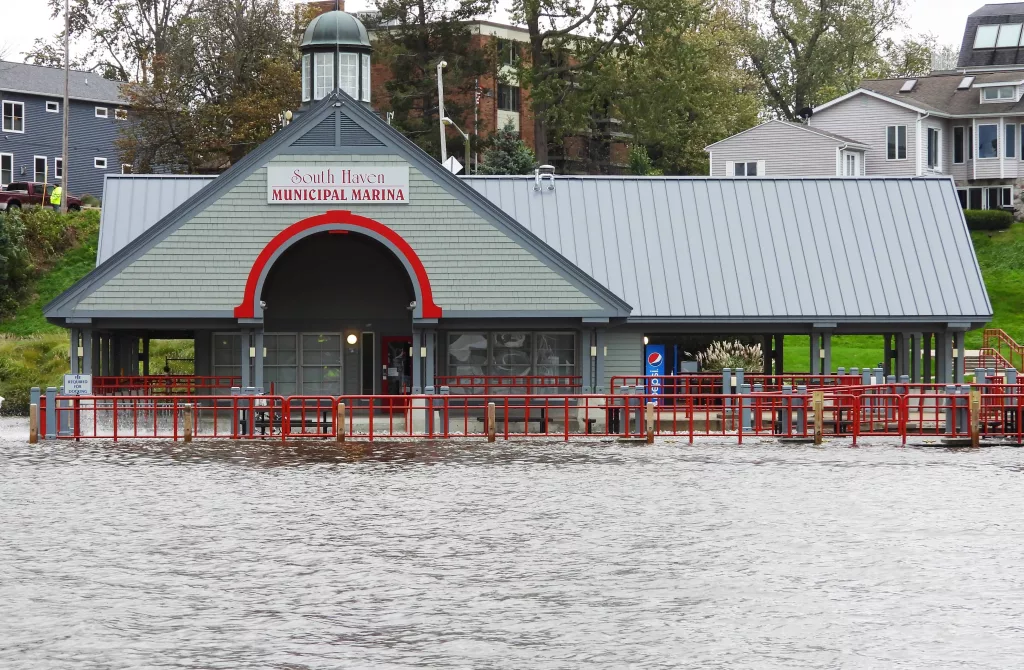Lake Michigan shoreline communities are getting good news in this first week of the brand new year that the bipartisan bill authored by Michigan’s U.S. Senator Gary Peters to address rising water levels and shoreline erosion in the Great Lakes has been signed into law. The new law provides support for local communities facing rising water levels, coastal erosion, and flooding that have put homes, property, and communities at risk, and caused millions of dollars in damages. Peters is the the top Democrat on the Homeland Security and Governmental Affairs Committee
Communities all across Michigan, including right here in Michigan’s Great Southwest, continue to face serious shoreline erosion challenges that have destroyed homes and beaches and have even forced residents to relocate. The STORM Act establishes loans that local governments could access to help mitigate the impact of rising water levels, coastal erosion and other damage caused by natural disasters in a more cost-effective way. Studies have shown that resilience and mitigation spending saves taxpayers more than $6 for every dollar invested.
Peters says, “Climate change and high water levels on the Great Lakes are causing serious damage to our shorelines and harming the livelihoods and property of too many Michiganders. Providing our Michigan’s coastal communities with loans so they can build back resiliently will help ensure that our coastlines in Michigan remain safe and pristine,” and adds, “I am thrilled this bipartisan bill has been signed into law and look forward to continuing my work to help mitigate the effects of this naturally occurring damage.”
Peters’ colleague in the U.S. Senate, Senator Debbie Stabenow concurs, saying, “I have seen firsthand how record high Great Lakes water levels have hurt coastal communities. This is the type of investment local officials and residents need and it is great news that help is on the way.”
The STORM Act will allow the Federal Emergency Management Agency (FEMA) to fund and help states establish revolving loan funds that could be used by local governments to carry out mitigation projects that reduce natural disaster risk, including shoreline erosion and rising water levels. Unlike existing FEMA grants, these low-interest loans would allow local governments to invest in resiliency and mitigation projects that help reduce loss of life and property, the cost of insurance, and disaster recovery payments. These loans would reach communities more quickly than FEMA’s traditional grants and provide local communities with capital necessary to invest in more resilient infrastructure.
High water levels intensify the impact of high winds and contribute to shoreline erosion. Along the Great Lakes, rising water levels have already flooded campgrounds and streets, caused boating problems due to submerged structures, and destroyed several beaches and homes. These disasters often cause long-term economic, social, and environmental effects for states and communities, including deaths, injuries, property destruction, and an increased burden on taxpayers. Currently FEMA programs are unable to provide assistance for projects related to sustained high water levels and long-term shoreline erosion. This bill would ensure that communities facing these hazards are eligible for loans to fund such mitigation projects.
Bentley Johnson, Senior Partnerships Manager for the Michigan League of Conservation Voters, says, “The climate change crisis is already creating strange weather events and excessive rainfall in Michigan,” and adds, “Record-high lake levels are eroding our coasts, swallowing sand dunes and beaches, and threatening communities in many ways. Flooded farm fields are hurting farmers and run-off pollution threatens our sources of drinking water. Local governments must be equipped to combat this crisis, now and in the future, which is why this bill is so important. We applaud Senator Peters’ to tackling this crisis head on and advancing a critical tool for Michigan to protect our water, our air and our economy.”
The photo accompanying this story on Moody on the Market is courtesy of Professional Photographer Tom Renner of South Haven.






